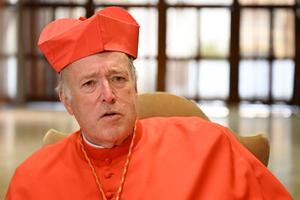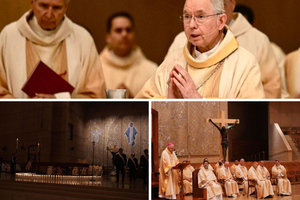From Synod, Archbishop Gomez Emphasizes Unity of Doctrine and Practice
This unity, combined with the diversity of popular piety, gives the Church great resources for building a ‘a new missionary confidence and courage,’ the archbishop of Los Angeles said.

VATICAN CITY — The Catholic Church needs “a new missionary confidence and courage” that draws on Church unity and the recognition of God’s unwavering vision for the family, Archbishop Jose Gomez of Los Angeles has said.
“We need to find creative, positive ways to proclaim God as Creator and to show the beauty of his plan for the human person and the family,” he said in an Oct. 20 column for Los Angeles’ Angelus News.
“With the unity of our doctrine and practice, and the rich diversity of our local traditions of popular piety, the Church has tremendous resources to resist pressures and worldly powers and to proclaim the Gospel to a new generation.”
He said it was striking for him to realize “that the Church today is able to truly pray, teach and evangelize in one voice — as one family of God, drawn from every nation, people and language, united in our faith in the Gospel and our communion with the Holy Father in Rome.”
Archbishop Gomez is currently at the Synod of Bishops, which is meeting at the Vatican Oct. 4-25 to consider the vocation and mission of the family in the Church and the world.
The archbishop reflected upon the Sunday joint canonization of Louis and Zelie Martin, a 19th-century French married couple whose daughters included St. Therese of Lisieux. He praised their “humble, hidden life” rooted in daily Mass and the duties of everyday life.
They knew love, joy, suffering and sadness, he said, adding that such saints are not rarities.
“There are holy spouses and holy families in every part of the world today — ordinary men and women trying to live faithfully by the Church’s teachings and the grace of her sacraments,” he said.
“This is what the synod on the family is meant to be all about — helping spouses in their vocations as husbands and wives, helping them to meet the challenges they confront in society, inspiring them to live out God’s beautiful plan for their lives.”
The archbishop cited Pope Francis’ description of marriage as “God’s dream for his beloved creation.”
“Jesus Christ revealed this dream by coming into the world in a human family,” Archbishop Gomez continued. “The Holy Family of Nazareth shows us that every family is meant to be an ‘icon’ of God, an image of the Holy Trinity in the world.”
Gifts From God
Archbishop Gomez said marriage and the family are gifts from God, inscribed in the order of creation. He stressed the marital vocation of men and women as “a communion of love that is faithful for life and fruitful in creating new life.”
“These basic truths of creation are the source for everything that the Church believes, teaches and practices about marriage and family,” he said. “The Church is called to proclaim these truths to the world in all their fullness and in all their beauty.”
Archbishop Gomez suggested that media coverage can distort Catholic teaching to depict it as a political policy or position.
“Catholicism is a vision of creation, a vision of the human person and the human family, a vision that is grand and transcendent,” he countered. All Church teaching, practices and discipline flow from this vision, “given to us by God in the Scriptures and the Church’s living Tradition.”
The archbishop reflected on the state of the family.
“At the root of the family crisis is a crisis of confidence in God — a loss of the sense that he is our Father and Creator, and that he has a plan, a ‘dream’ for his creation, a plan for our lives. The family today is threatened by the same ‘anthropocentric’ and ‘technocratic’ mentality that Pope Francis warns about in ‘Laudato Si,’ his encyclical on creation,” Archbishop Gomez said.
This mentality rejects the realities of creation and human nature and sees nature, social institutions and the human body and mind as material to be engineered.
The archbishop suggested that some Catholic bishops’ sense of urgency and even anxiety at the synod drew on the sense of the “profound” family crisis and the economic, cultural and ideological threats to the family.
For Archbishop Gomez, these threats include forced sterilization and abortion, embryonic experimentation, contraception, the redefinition of marriage and the “surgical manipulations of femininity and masculinity.”
“In confronting this broad cultural crisis of the family, the Church needs to proclaim once more the beautiful truth about the human person and God’s loving plan for creation and the family,” Archbishop Gomez said, adding: “If we lose the family, we lose God’s plan for our lives and for the world.”
‘Reach Out With Tenderness’
Archbishop Gomez did not ignore non-Catholics and inconsistent Catholics.
“The Church is also called to reach out with tenderness to those who are having trouble understanding and living these truths,” the archbishop said.
He also noted Pope Francis’ call after the 2014 synod not to sacrifice truths in order to “please the people.” He recalled the Pope’s warning against a deceptive view of mercy that “binds wounds without first curing them.”
Archbishop Gomez said that “kindness and compassion can never be separated from God’s plan.
“A person’s conscience is sacred. But our conscience is only reliable if it is formed according to the truth that God has written into our hearts and the loving plan he has for our lives.”
- Keywords:
- archbishop jose gomez
- archdiocese of los angeles
- catholic news agency
- marriage and the family
- synod on the family 2015
- synod_2o15
















